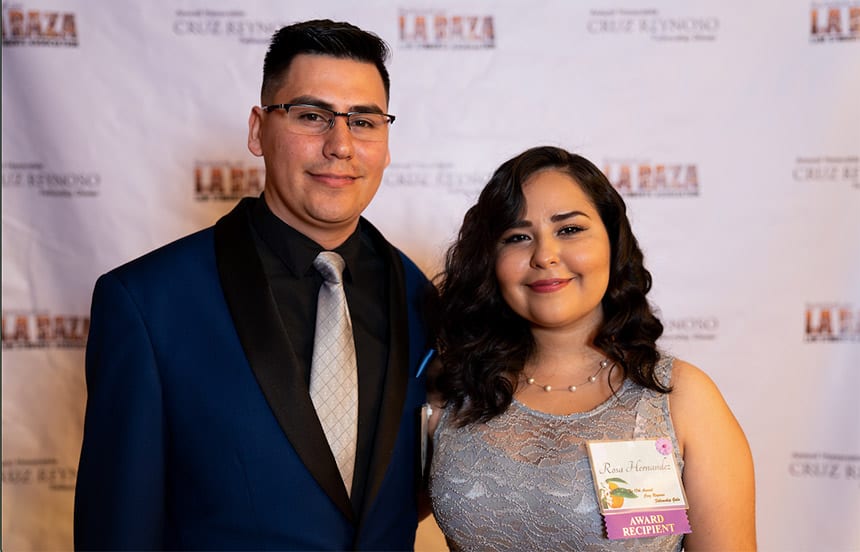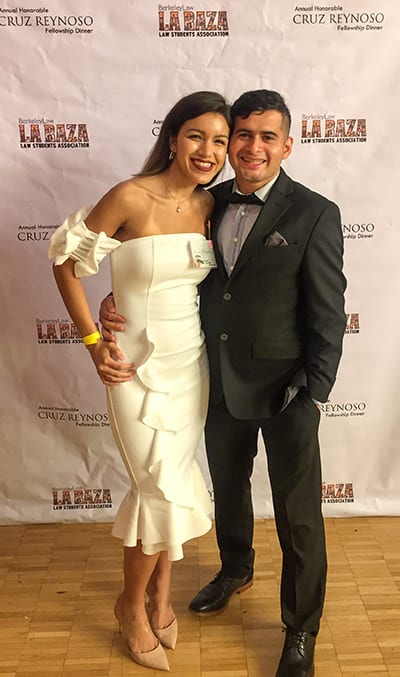
By Andrew Cohen
Like many law students, Karla Maradiaga ’21 and Rosa Hernandez ’21 found themselves in scramble mode when COVID-19 forced the cancellation of in-person classes and other Berkeley Law events.
As co-chairs of the Cruz Reynoso Fellowship Gala, they felt an extra layer of stress—and responsibility—as the annual event raises funds to support Latinx Berkeley Law students pursuing otherwise unpaid summer public interest internships and judicial externships. Undaunted, their outreach to law firms, alumni, and other allies helped fund seven fellowship recipients who will serve marginalized communities and expand access to justice.
“Many first-generation professionals from low-income families feel they have to compromise their dreams of public service jobs when they face the harsh reality of paying for law school,” Hernandez says. “I wanted to make sure future generations of students had access [to the Cruz Reynoso Student Fund] to pursue the social justice lawyering that brought them to law school.”
This year’s fellows are:

Bar stipend recipients Kiki Tapiero ’20 (Bronx Defenders Immigration Unit), Anya Ku ’20 (clerk for Judge Nathanael Cousins, U.S. District Court/Northern District of California), and Vanessa Hernandez ’20 (aspiring San Bernardino County prosecutor); 2L summer recipient Oscar Sarabia Roman ’21 (ACLU Immigrant Rights Project); and 1L summer recipients Gaby Bermudez ’22 (District of Columbia Public Defender Service), Joy Navarro ’22 (Lawyers’ Committee for Civil Rights of the San Francisco Bay Area), and Omar Corona ’22 (Legal Aid Foundation of Los Angeles).
La Raza impact
Reynoso graduated from Berkeley Law in 1958. He was a California Supreme Court associate justice from 1982 to 1987, and served as vice chair of the U.S. Commission on Civil Rights. In 2000, President Bill Clinton awarded him a Presidential Medal of Freedom—the nation’s highest civilian honor—for his lifelong devotion to public service.
The fellowship fund in his name is administered by members of the La Raza Law Students Association who are part of the Cruz Reynoso Fellowship Committee. The committee fundraised in myriad ways to help address a jarring imbalance: while Latinx people exceed 18 percent of the U.S. population, they make up only 5 percent of its lawyers, according to an August 2019 American Bar Association report.
“La Raza was the educational environment that brought me up to speed so my experience as a first-generation law student would not hinder me, and it was the community that constantly reminded me that I could do it,” Ku says. “They were right.”
Roman says the fellowship “allows me to focus on my internship—fighting for immigrants’ rights—without worrying about how to pay for items like rent, food, or transportation.”
Extending Reynoso’s legacy
“I was interested in taking on the leadership role as co-chair because having worked in both nonprofit and private sector legal jobs, I’m acutely aware of the pay gap between the two,” Maradiaga says. “This pay gap often makes it very difficult for Latinx law students to pursue public interest opportunities.”
Maradiaga and Hernandez still hope to hold the gala next spring to commemorate the recipients’ accomplishments with the fellowship donors. Both say celebrating Berkeley Law’s Latinx community is an important part of sustaining momentum.
The Berkeley La Raza Journal is one of the only journals at a top law school that focuses on Latinx issues. In early March, Berkeley Law co-hosted the National Latina/Latino Law Students Association Conference for the first time.
“The strong sense of community amongst La Raza was definitely what drew me to attend Berkeley Law,” Hernandez says. “It’s been a difficult time to be Latinx and in law school; our communities are continuously under attack and it can feel disempowering to learn the many ways our legal system falls short in addressing these injustices. But the strong support we have from faculty is critical to helping us navigate these difficult times and it helps us think through the legal tools at our disposal as young professionals.”